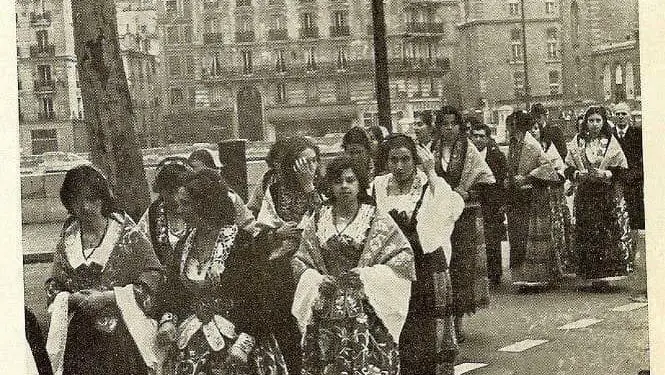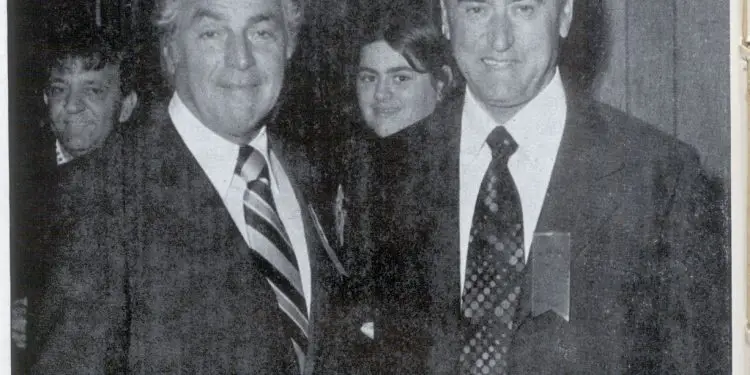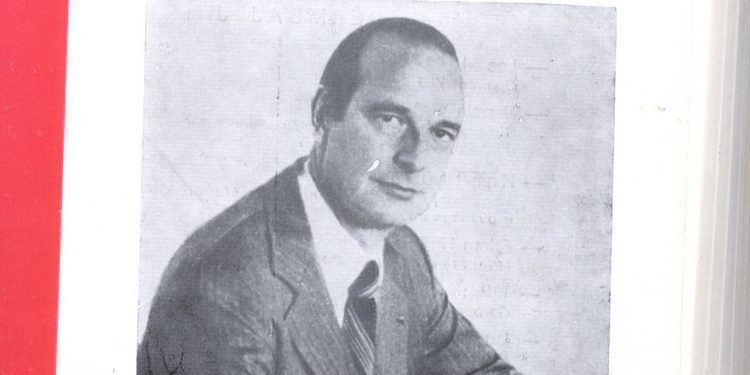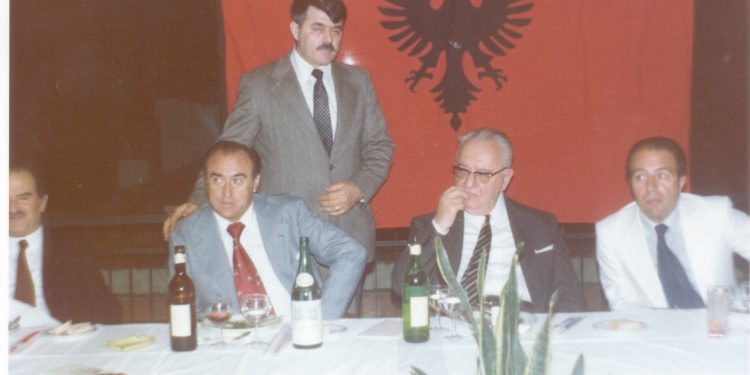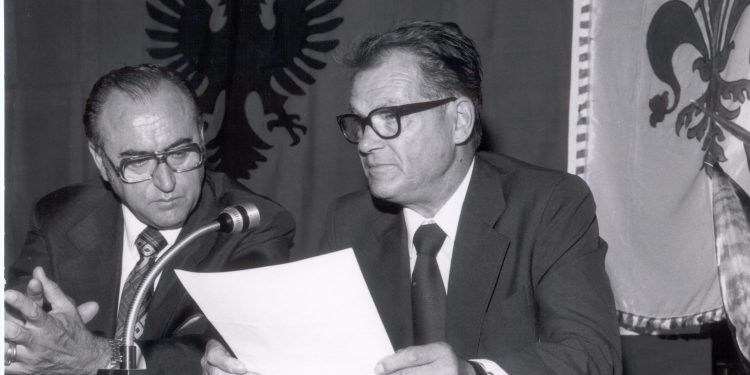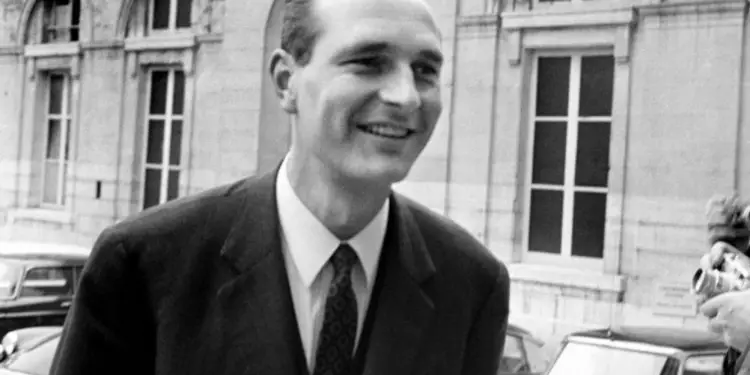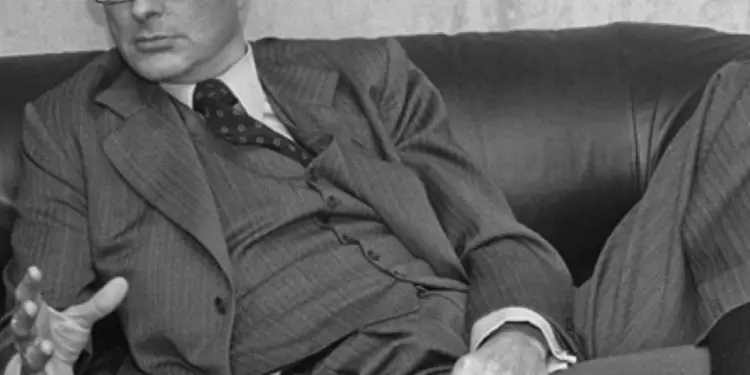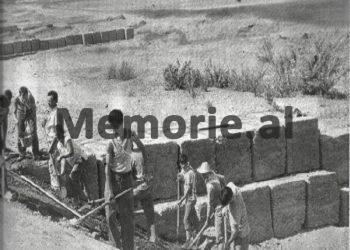Dashnor Kaloçi
Memorie.al/“After several years of efforts made by my brother, Isa Ndreu, with his friend, the well-known publicist of the Albanian anti-communist diaspora, Lec Shllaku, they managed to take their friend, Jacques Chirac, who was then in the capacity of the Mayor of Paris, the approval to give a square in the center of the French capital, the name of our National Hero, Gjergj Kastriot Skënderbeu. Shllaku and Isa had a close friend of the famous French politician, Jacques Chirac, and they had helped him in various election campaigns when he ran for the post of Prime Minister or Mayor of Paris. After many talks that Isai and Lec Shllaku had with their close friend Jacques Chirac, he convened the Paris City Council, which on July 10, 1978, on the occasion of the 100th anniversary of the League of Prizren, took the official decision and named it after Skanderbeg, one of the squares in the center of Paris, formerly called “Villa Lumier”.
After that decision was made, the official ceremony for naming that square “Skënderbej” took place on May 6 and 7, 1980, attended by dozens of personalities of the Albanian anti-communist diaspora from many countries around the world. Only the ambassador of Albania was absent from that magnificent ceremony, who could not come there for reasons that are already known. After that, as a sign of gratitude and respect, Lec Shllaku and Isa Ndreu, awarded a gold medal to Mr. Shirak, which was presented with a magnificent ceremony in Paris, attended by personalities from all over the Albanian anti-communist diaspora “.
He tells Memorie.al for the first time is 87-year-old Jonuz Ndreu (son of the nationalist Cen Elezi from Slova e Dibra) living in New York in the USA. He tells the whole story of how his brother, Isa Ndreu, together with the well-known publicist of the Albanian anti-communist diaspora, Lec Shllaku, with the help of the former mayor of Paris, made it possible to place the name of Skanderbeg in one of squares in the center of Paris. Who is Jonuz Ndreu. What is his past and where is he currently? Who is Isa Ndreu and Lec Shllaku, what is their past and how did they manage to perpetuate the name of Skanderbeg in the center of the French capital?
Who were Isa Ndreu and Lec Shllaku?
Isa Ndreu was born on March 7, 1919 in the village of Sllova, Dibra. He was the sixth son of Cen Elez, (People’s Hero), the famous Dibra patriot, who is well known for his wars in defense of the territorial integrity of Albania from the constant attacks of Serbo-Montenegrins in the first two decades. of the last century. Isa Ndreu received his first lessons in the boarding school “Dibra” in the village of Kastriot. After he came out with good results, he was sent to attend classes at the “Normale” school in Elbasan. After finishing it with very good results, his father, Cen Elezi, sent him to study in Italy, at the Faculty of Law at the University of Florence, where he graduated in philosophy.
The end of the war found Isa Ndreu in Florence, Italy. Seeing the attitude that the communist regime held towards his family in Albania, he did not return to his homeland, but continued to stay there. Since the end of the war until today, Isa Ndreu has been engaged in a private business activity and is known throughout the Albanian diaspora, not only as a great industrialist, but also for his anti-communist activity and mainly as a publicist and publisher of the magazine of known “Our Time”. That magazine, from its creation onwards until it closed in 1991, Isa Ndreu entrusted to direct it as an editor, to his close friend, the publicist and well-known intellectual, Lec Shllaku, originally from the Shkodra Highlands.
Lec Shllaku was born in 1915 in the village of Shllak in Shkodra, from where his tribe inherited the surname. After receiving his first lessons at the Franciscan College of Shkodra, Leci was sent to the “Normale” school in Elbasan, where he attended classes regularly and finished with excellent results. In the mid-1930s, Lec Shllaku went to Italy and studied pedagogy at the University of Florence. During that time, his compatriot, Isa Ndreu, also studied at that university.
Since then they both had a close friendship, which they never broke. Like Isai, Lec Shllaku did not return to Albania, because the communist regime persecuted his family in the most barbaric way in the Shkodra District. Since the end of the Second World War, Lec Shllaku settled in the French capital, Paris, and all the time he has been engaged in albanological studies and especially in journalism. Lec Shllaku has edited several well-known newspapers and magazines of the Albanian anti-communist diaspora, such as “Kombi Shqiptar”, “Shkumbini” and “Koha e Jonë”. He has also published several articles in “Signs” (by Ernest Koliqi), “The Sun” and in “Progresso” (Italian-American) in New York. In addition, in 1983, Lec Shllaku published the book “Skanderbeg”. In addition to these research and journalistic activities, Lec Shllaku and his friend Isa Ndreu, since 1962 have published the magazine “Koha e Jonë” and also since then they have directed all the activity of the Democratic Union Party in the diaspora and after 1991, also in Albania.
Shllaku and Ndreu, publishers of the magazine “Koha Jonë”
Although Isa Ndreu continued to live in Florence, Italy, and Lec Shllaku in the French capital, Paris, the two never severed ties and met regularly in both France and Italy. Regarding this and their activity in the direction of the well-known magazine with anti-communist content “Koha e Jonë” and the political activity in the direction of the Democratic Union Party, 87-year-old Jonuz Ndreu, testifies: “My brother Isa Ndreu, together with his friend his close friend, the well-known publicist of the Albanian anti-communist diaspora, Lec Shllaku, kept the old friendship that they had started since they were together in the banks of the “Normal” school of Elbasan and had continued during their studies at the University of Florence, Even after the Second World War, my brother Isai in those years devoted himself to private business by engaging in trade, while Lec Shllaku continued his research work as an intellectual and publicist.In 1962, when the Soviet Union led by Nikita Khrushchev gave the signs of a liberal policy and approached the United States, they came up with the idea of publishing and publishing an anti-communist magazine, and they made that idea a reality. it, launching the magazine entitled “Our Time”, which they continued to publish regularly once a month for more than 30 years. In its pages were collected and published many articles by well-known personalities of the Albanian anti-communist diaspora, well-known publicists and writers located in countries around the world, such as: Arshi Pipa, Tahir Kolgjini, Martin Camaj, Petër Prifti, Xhevat Kalajxhi, Hasan Dosti, Monsignor Zef Shestani, Ragip Frashëri, prof. Miftar Spahia, Ndue Pjetër Gjomarkaj, Gjon Gjomarkaj, Hiqmet Ndreu, Fehmi Kokalari, Adem Hodo, Isuf Luzaj, Ago Agaj, Rreshat Agaj, Mentor Qoku, Gjon Sinishta, Kimete Basha, Renzo Falaski, Nermin Vlora Babali, Ismail Rexhepi etc. The pages of the magazine truly reflected the culture, traditions, folklore and history of the Albanian people, which was distorted in the most barbaric way by the communist regime of Enver Hoxha in Albania. That magazine became a tribune of free thought of dozens and dozens of Albanian intellectuals from all over the world, whose words were never censored as was done in our homeland occupied by the communist clique of Enver Hoxha. Although my brother Isai was the sole funder of that magazine, he never claimed to make a single dollar from it, but instead distributed it for free throughout the world where the Albanian community lived. But even that magazine had its problems and the two publishers, Isa Ndreu and Lec Shllaku, had many consequences from the pressures initiated and hatched by official Tirana and its communist leadership led by Enver Hoxha. “Since the communist left in Italy was closely linked and regularly funded by the communist regime of Enver Hoxha, Isai and Lec Shllaku, who published that magazine in Florence, were forced to give her address as if it were published in Paris. 87-year-old Jonuz Ndreu, for his brother, Isa Ndreu, and Lec Shllaku, who for more than 30 years published in Florence, Italy the magazine “Koha e Jonë”.
Paris Mayor Jacques Chirac approves Skanderbeg Square
But that wish of Ndreu, Shllaku, Skënder Zogu and the entire Albanian community of Paris, that one of the squares of the French capital be named after our National Hero, Skënderbeu, became a reality only on July 10, 1978.
That coincided exactly on the day that all Albanians around the world celebrated with great pomp the 100th anniversary of the Albanian League of Prizren. The approval of the request of the Albanian community of Paris, represented by Lec Shllaku, Skënder Zogu and Isa Ndreu, was made after many efforts of Mr. Jacques Chirac, who at that time held the position of Mayor of Paris.
In this regard, Jonuz Ndreu testifies; By naming Skanderbeg, the “Villa Lumier” square in Paris, Mr. Jacques Chirac, not only fulfilled a request of the Albanians living in that city, but he raised the prestige and pride of Albania, making us our National Hero, Gjergj Kastrioti Skënderbeu, to be known even more in the World ”
How did the Albanian community of Paris experience that event?
This is best evidenced by an article by Mr. Isa Elez Ndreu, published in those days his magazine “Koha e Jonë” where among other things it is said: “Even in Paris, the capital of France, we will have ‘SQUARE Skanderbeg. The decision was taken by the Municipal Council, which on July 10, 1978 gave its consent and decided that Square AZ / 19 be baptized with the name of our National Hero. It took almost ten years to reach this conclusion, which has delighted all Albanians, the history of which we will publish in a separate volume later. From the letter that Mr. Lec Shllaku addressed to his compatriots, it is understood how the talks and correspondence between the Municipality and him took place, and how much good will and patience was needed by our compatriot, until he achieved the goal: to perpetuate the memory of Skanderbeg in Paris. The temporary “Koha e Jonë” is giving this happy news of the cinnamon, they convince him that all Albanians, wherever they are, will feel the same sedation and longing.
We feel it is our moral and national duty to address, in the first place, His Excellency, Mr. Jacques Chirac, and the Mayor of Paris, our gratitude and the sincerest thanks that, with his intervention, make such a miracle possible. We also send our thanks to the Cultural Commission of the Municipality through Mr. Roger Roman, who with kindness and competence, has given a favorable opinion about your merits and considered Skanderbeg worthy and worthy of a square or street to honor His name.
Finally, we address a deep gratitude to the Municipal Council, through the person of Mr. Bernard Rocher, who Council decided to perpetuate the name of Skanderbeg tue dedicated a square of the capital. We cannot stay without congratulating our friend and collaborator, Lec Shllaku, who with his persistent intervention, achieved the goal “. Isa Elez Ndreu.
Albanian medal for Shirak
As a sign of gratitude for what Mr. Jacques Chirac did for the Albanians, Ndreu, Shllaku and Skënder Zogu, took the initiative and awarded him a Gold Medal, which was handed to him in a magnificent ceremony in Paris. The ceremony was attended by many personalities of the Albanian anti-communist diaspora from around the world, in addition to the ambassador of Albania who was accredited at the time in Paris. The medal was awarded and the square was named on the occasion of the 500th anniversary of the death of the National Hero Gjergj Kastrioti Skënderbeu, and it was Isa Ndreu and Lec Shllaku, respectively the chairman and secretary of the Democratic Union Party who named a square in Paris after “Skënderbeg”. France. It was this relentless effort of Isa Ndreu, his devotion and persistence and that of other patriots, in Rome, Paris, and Brussels, that in 1978, was approved by the Municipality of Paris (City Council) with Mayor Jacques Chirac, who to be called Skënderbeg Square.
This is also mentioned in an article published by Lec Shllaku, in December 1987, on the occasion of the tenth anniversary of the naming of Skanderbeg, the square in the center of Paris. Among other things, it reads: “After the baptism of the Square dedicated to our National Hero Gjergj Kastriot Skanderbeg, was carried out with a lot of patience and perseverance, in Paris, the second objective was that of another adventure, close in time, such as the erection of a monument and of a commemorative medal, at least, on the occasion of the first 10th anniversary. The idea of a monument in itself presents a series of problems and especially difficulties on the part of the Ministry of Culture and World Affairs, in addition to finding the sculptor capable of perfecting a work of art. But the main obstacle is the solution of the financial problem, which in the conditions we are in, appears unsolvable, without the support of the Paris Municipal authorities.
It goes without saying that the Skanderbeg monument remains a wish, but that of the medal, which requires a relatively low amount of money, for a number of favorable circumstances was realized. The anniversary of the decision of the Paris City Council to perpetuate the name of Skanderbeg in the French capital was taken on July 10, 1978, so that the following July (1988) marks the tenth anniversary and the Memorial Medal was dissolved on that date. the most artistic form by the Friend of Albanians, Mr. Josef Baier, in his plants in Austria.
The inauguration of the Square took place on May 6 and 7, 1980, in Paris, and it was Mr. Baier who found the time and opportunity for the realization and writing of the Medal, seeing it also from a historical point of view. We must emphasize here with kindness and sympathy that Mr. Baier has produced the medal without any reward, for free, only to realize our wish: to commemorate Skanderbeg once again in foreign lands but Friend. But we make the medal available to our compatriots at a reasonable price, and the amount that will be collected from the sale of the medal, will be used to write a piece of gold. To give to Mr. Jacues Chirac, which will hand over to an Albanian representation, to express at the same time our gratitude for his intervention in favor of the perpetuation of Skanderbeg in the toponym Ville Lumierë.
Considering the high price of gold (metal) and that the medal has considerable dimensions and a weight of 90 grams, we turn to our compatriots to support us to buy the medal, in order to make in this case, a noble gesture to Mr. Chirac, return the honor he has done us. Our wish is that on the occasion of the 10th anniversary (July 1988) we hold a gathering of compatriots in Skanderbeg Square in Paris.
For this reason, we turn to friends and loved ones who wish to participate in that event, to have the kindness to notify us in advance by contacting us. In that case it is thought to be established; Cercle Franco-Alabnias Scanderbeg; who will deal exclusively with cultural and social issues and will be headed by a French personality.
We take this opportunity to emphasize that the project for a monument to Skanderbeg and the Albanian language translation by the French Radio International, based on correspondence with the relevant Ministry, will have positive results. I wish you all the best and the upcoming holidays, I greet you with friendship, Paris, December 1987 “, writes Lec Shllaku in the Magazine” Koha Jonë ”
Who is Jonuz Ndreu
Jonuz Ndreu was born in 1932. He is the penultimate son of the children of Cen Elez, the son of Elez Isuf from Slova e Dibra, who even during the communist regime, was recognized and valued as one of the greatest patriots alongside Bajram Curr. As Cen Elezi was one of the most prominent nationalists and anti-communists in all of Northern Albania, in March 1946, the communist regime declared him an enemy. Following this, and to escape arrest by the Pursuit Brigades, Cen Elezi fled his homes in Slovo, Dibra, and hid in the mountains with some of his brothers and sons. After fleeing for some time, in 1949 he fled Albania and fled to Yugoslavia. There he died under torture by the Slavo-Macedonian communists in the Skopje prison where he was held in solitary confinement for several months. Since 1946, when Cen Elezi fled to the mountains, the communist regime of Tirana deported his family, with women and children, to Berat Castle. One of those children who were interned at that time in Berat, was the penultimate son of Cen Elez, Jonuzi, who at that time was not more than 14 years old. But how could Jonuz Ndreu escape from Albania and settle permanently in the US? In this regard, he testifies: “After being left for some time in the city of Berat, we were again interned as a family in the terrible camp of Tepelena where an average of seven or eight people died every day. The other, Tafili, moved us again and took us to a village in Gramsh, where we could not withstand the brutal oppression and persecution of our family, and Tafili and I decided to flee Albania. we fled from Gramsh and after staying hidden for some time in the mountains of Dibra, at the end of 1949, we crossed the border illegally and went to Yugoslavia, together with some people such as: Fiqëri Dines’s son, Xhelali, Abdulla Kaloshi and Muhamer Kadriu In Yugoslavia we were left for some time in the Gerova camp in Croatia and then with the help of a charity we were able to go to Italy as political asylum seekers.After staying for some time in Italy, I was able to go to Repu the German Federal bloc where I served for some time in one of the American bases that were then set up in that country. “After serving for five years at that military base, I was released as a civilian and from there I emigrated to the United States, where I joined several other members of our tribe, who had lived there for years as political asylum seekers.” Jonuz Ndreu recalls his departure from Albania and settling in the US From that time until today, he continues to live in New York, where until a few years ago he worked as a caretaker in an apartment complex of a very In addition to that private work, Jonuz Ndreu is known throughout the Albanian community living in the US, as an activist and member of the presidency of the patriotic association “Fire”, and for his activity in the ranks of the anti-communist diaspora living from Jonuz Ndreu is so popular in the Albanian-American community that when he was hospitalized in a car accident, hundreds of people went to visit him. fell his Albanian compatriots in the diaspora. That thing made a great impression on the hospital doctors, who asked in amazement who their patient was./Memorie.al




